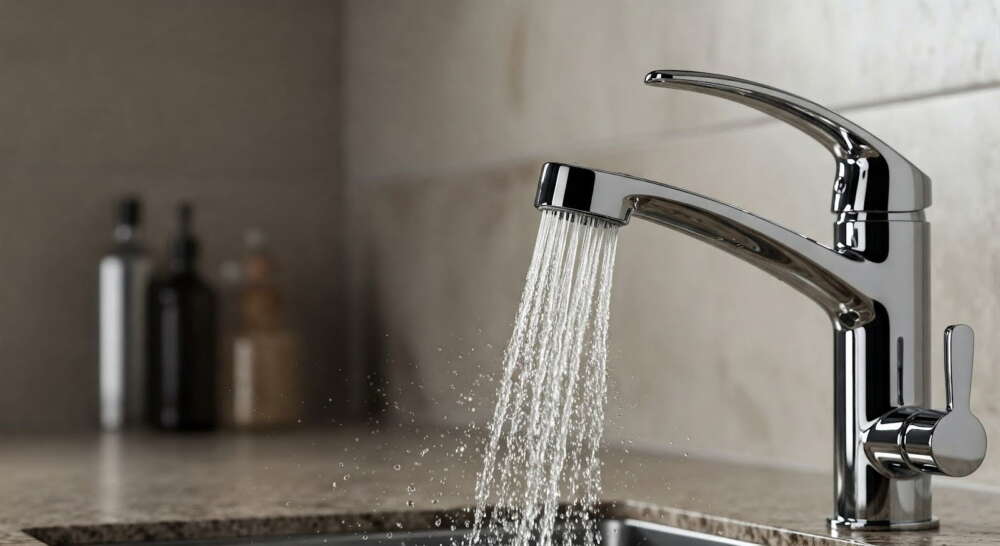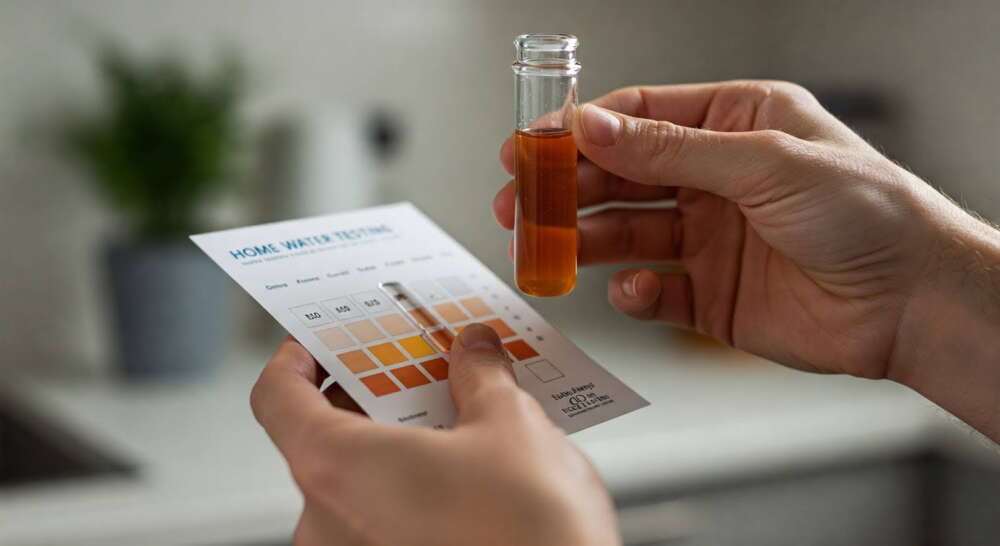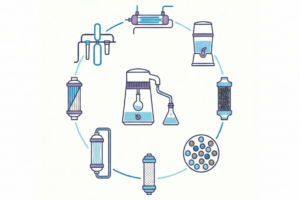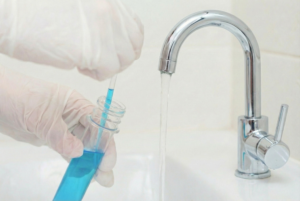Rust in Water: What’s Behind It and What Can You Do About It?
-


In this article
No one wants to turn on their faucet and see rusty-colored water pouring out. But if you’ve noticed rusty water coming from your tap, it’s not just an eyesore – it might impact your health, plumbing, and appliances. This rust isn’t just inconvenient; it’s a sign of underlying issues in your water quality that need attention.
Whether you’re pulling water from a well or a municipal supply, this guide will help you understand why there’s rusty water, what it means for your health, and the practical steps you can take to fix the problem.
What is Rust in Water?
Rust forms when iron or steel structures corrode due to oxygen and moisture exposure. When pipes, well casings, or even your water heater start corroding, they release tiny particles of iron oxide into your water supply, giving it that reddish-brown color.
If you’re on a well water supply, rust in well water is often caused by high iron levels in the groundwater. However, even municipal water supplies can experience rust contamination due to aging water mains or poorly maintained infrastructure.
What Causes Rust in Your Water?
Understanding the root cause can help you address the problem effectively. Here are the common culprits:
1. High Iron Levels in Groundwater
If you rely on well water, there’s a good chance that your groundwater contains naturally high levels of iron. Rainwater seeps into the soil and dissolves iron deposits, which then make their way into your well.
2. Corroded Pipes
Old or corroded plumbing systems are one of the most frequent causes of rust in water. Over time, metal pipes (especially those made of steel) break down, allowing rust particles to enter your home’s water.
3. Aging Water Heaters
Water heaters can also cause rust contamination. A failing anode rod (the part that prevents tank corrosion) or an old heater tank can introduce rust to both your hot and cold water supplies.
4. Municipal System Issues
Even homes using municipal water supplies can experience rust in their water. Older infrastructure, such as corroding water mains, or construction work near pipes can lead to rusty tap water.
Is Rust in Water Harmful to Your Health?
The good news is that rust in your water is typically not dangerous to your health. Iron, the primary culprit behind rust contamination, is a mineral your body needs in small amounts. However, ingesting large quantities of iron consistently can lead to unwanted side effects, such as stomach upset or staining on your teeth. High levels of rust may also indicate other issues, such as corroded pipes or deeper plumbing problems. If there are extreme levels of rusty water, you should be testing immediately for bacteria or other potential contaminants to ensure it is safe to use.
That said, rusty water poses a bigger problem for your plumbing, appliances, and daily life:
- Clogging Pipes: Rust particles can accumulate in pipes, reducing water pressure and increasing the likelihood of clogs.
- Damage to Appliances: Washing machines, dishwashers, and water heaters can suffer from rust buildup, which reduces their efficiency and lifespan.
- Stains: Rust causes unsightly stains on clothes, sinks, and tubs that can be difficult to remove.
For peace of mind and the longevity of your plumbing system, it’s a good idea to address rusty water promptly.

Fixing Rusty Water: 6 Steps to Cleaner Water
Whether your rusty water issue is a one-time occurrence or a recurring problem, there are clear approaches to fix the underlying issue. Here’s what you can do:
1. Test Your Water
The first step is identifying the source of the problem. Use a water testing kit or hire a professional to analyze your water. Look for:
- Iron levels
- pH levels (as low pH can indicate corrosive water)
- Suspended solids and bacteria
If the rust is localized to your well supply, confirming the iron levels will help you decide your next step.
Read about tap water testing here. Read about well water testing guidelines here.
2. Inspect Your Plumbing System
If the testing reveals low levels of iron, the rust could originate from within your home. Do a walkthrough of your plumbing system to check for any corroding pipes or connections. If your pipes are over 20 years old and made of galvanized steel, replacing them with PVC or copper may solve your rust problem for good.
3. Use a Water Filter Pitcher
If the rust issue is limited to your drinking water, consider using a filter pitcher. Pitchers like the Lotus ENYA Water Filter Pitcher are designed to remove pollutants, including rust particles, and improve taste while adding essential minerals.
4. Flush Out Your Water Heater
If the rust is only present in your hot water, check your water heater. Regular sediment flushing is an essential maintenance task to avoid rust and debris buildup.
5. Consider Installing a Water Softener or Iron Filter
For homes with rust in well water, filtration is your best option. Two common filtration systems that work effectively are:
- Water softeners designed to remove minerals like calcium, magnesium, and some iron.
- Iron filters tailored specifically for removing higher concentrations of iron from your water supply.
Water softeners and iron filters prevent rust particles from entering your home, keeping your pipes, appliances, and laundry safe from stains and damage.
6. Invest in Whole-House Water Filtration
For a long-term solution, installing a whole-house water filtration system ensures clean, safe, and rust-free water for all uses. Full-scale systems are better equipped to address widespread rust problems, providing clean water for every tap in your home.
Preventing Rusty Water
After addressing rust contamination, you’ll want to take steps to prevent it from occurring again. Here are some tips:
- Routine Maintenance: Schedule regular inspections of your plumbing system and water heater.
- Use Corrosion-Resistant Materials: If replacing pipes, opt for PVC or copper pipes that won’t rust over time.
- Install Pre-Filters: For well water systems, pre-filters can catch larger rust particles before water enters your home.
- Raise Awareness for Municipal Systems: If you suspect the rust comes from public water mains, report the problem to your local water authority.
Time for Clean, Rust-Free Water
Rusty water doesn’t have to be a permanent issue. Whether it’s time to replace old pipes or install an iron filter, there are effective solutions to ensure your water is clear, healthy, and better-tasting.
If you’re serious about improving your water quality, consider investing in high-quality filtration systems, like the ENYA water filter pitcher, which removes pollutants and enriches your water with essential minerals.
Say goodbye to rusty water and hello to a better drinking experience!
You might also like these articles

Is Your Water Filter “Too Clean”? Why Minerals Matter
Does your filter remove healthy minerals? Learn why calcium and magnesium are vital for hydration and how to filter toxins without stripping nutrients.

Why Does My Tap Water Smell Like Chlorine? (And How to Fix It)
Does your water smell like a pool? Learn why taps smell like chlorine, if it’s safe, and how to remove chlorine from water.

The #1 Reason Your Drinking Water Tastes “Off”
Picture this: you wake up in the morning, reach for a glass of water, and immediately notice something’s wrong. Maybe it’s that chalky film coating your favorite drinking glass, or perhaps it’s the crusty buildup around your kettle that no amount of scrubbing seems to eliminate. Your once-reliable coffee machine